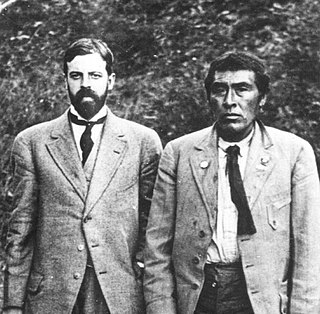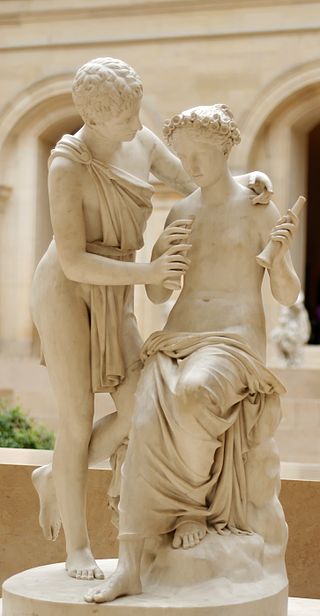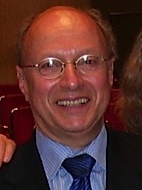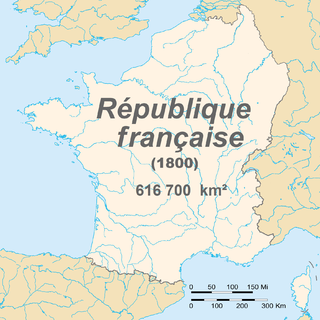Related Research Articles

Alfred Louis Kroeber was an American cultural anthropologist. He received his PhD under Franz Boas at Columbia University in 1901, the first doctorate in anthropology awarded by Columbia. He was also the first professor appointed to the Department of Anthropology at the University of California, Berkeley. He played an integral role in the early days of its Museum of Anthropology, where he served as director from 1909 through 1947. Kroeber provided detailed information about Ishi, the last surviving member of the Yahi people, whom he studied over a period of years. He was the father of the acclaimed novelist, poet, and writer of short stories Ursula K. Le Guin.

Daphnis and Chloe is an ancient Greek novel written in the Roman Empire, the only known work of the second-century AD Greek novelist and romance writer Longus.
Neil Joseph Smelser (1930–2017) was an American sociologist who served as professor of sociology at the University of California, Berkeley. He was an active researcher from 1958 to 1994. His research was on collective behavior, sociological theory, economic sociology, sociology of education, social change, and comparative methods. Among many lifetime achievements, Smelser "laid the foundations for economic sociology."

Robert Choate Darnton is an American cultural historian and academic librarian who specializes in 18th-century France.
Timothy James "T. J." Clark is a British art historian and writer. He taught art history in a number of universities in England and the United States, including Harvard and the University of California, Berkeley.

Marie Huot was a French poet, writer, feminist, animal rights and vegetarianism activist.

Nicholas B. Dirks is an American academic and the former Chancellor of the University of California, Berkeley. Dirks is the author of numerous books on South Asian history and culture, primarily concerned with the impact of British colonial rule. In June 2020, Dirks was named president and CEO of The New York Academy of Sciences.
Frederic Evans Wakeman Jr. was an American scholar of East Asian history and Professor of History at University of California, Berkeley. He served as president of the American Historical Association and of the Social Science Research Council. Jonathan D. Spence said of Wakeman that he was an evocative writer who chose, "like the novelist he really wanted to be, stories that split into different currents and swept the reader along," adding that he was "quite simply the best modern Chinese historian of the last 30 years."
Patrick Vinton Kirch is an American archaeologist and Professor Emeritus of Integrative Biology and the Class of 1954 Professor of Anthropology at the University of California, Berkeley. He is also the former Curator of Oceanic Archaeology in the Phoebe A. Hearst Museum of Anthropology, and director of that museum from 1999 to 2002. Currently, he is professor in the department of anthropology at the University of Hawai'i Manoa, and a member of the board of directors of the Bishop Museum.
Herrick Chapman is a prominent historian of France. Since 1992 he has been employed at New York University, where he is Professor of History in the Department of History and Institute of French Studies. Professor Chapman was educated at the University of California, Berkeley and Princeton University.
Jacques de Caso is a French-born American historian who specializes in the literature and history of pre-modern art in Europe, principally late eighteenth- and nineteenth-century French and German neo-classicism and Romanticism.
Jon Gjerde was an American historian and the Alexander F. and May T. Morrison Professor of American History and American Citizenship at the University of California, Berkeley, where he also served as dean of the Division of Social Sciences in the College of Letters and Science at the University of California, Berkeley.

James Clifford is an interdisciplinary scholar whose work combines perspectives from history, literature, history of science, and anthropology.

Nell Irvin Painter is an American historian notable for her works on United States Southern history of the nineteenth century. She is retired from Princeton University as the Edwards Professor of American History Emerita. She has served as president of the Organization of American Historians and as president of the Southern Historical Association, and was appointed as chair of MacDowell's board of directors in 2020.

Alva Noë is an American philosopher. He is Professor of Philosophy at the University of California, Berkeley. The focus of his work is the theory of perception and consciousness. In addition to these problems in cognitive science and the philosophy of mind, he is interested in analytic phenomenology, the theory of art, Ludwig Wittgenstein, enactivism, and the origins of analytic philosophy.

Ira M. Lapidus is an Emeritus Professor of Middle Eastern and Islamic History at The University of California at Berkeley. He is the author of A History of Islamic Societies, and Contemporary Islamic Movements in Historical Perspective, among other works.
Arthur Gilchrist Brodeur was a scholar of early English, German, and Old Norse literature at the University of California, Berkeley. He is known primarily for his scholarly work on Beowulf and his translation of Snorri Sturluson's Prose Edda for The American-Scandinavian Foundation, but also as a writer of pulp fiction and for his left-wing politics.

The natural borders of France were a nationalist theory developed in France, notably during the French Revolution. They correspond to the Rhine, the Atlantic Ocean and Mediterranean Sea, the Pyrenees and the Alps, according to the revolutionaries.

Renan Larue is a French writer, literary scholar and historian of vegetarianism. He is the author of several books on vegetarianism or veganism, including Le végétarisme et ses ennemis (2015), a history of vegetarianism from Pythagoras until the modern day, and La pensée végane: 50 regards sur la condition animale (2020). In 2016 he offered the first course in vegan studies in the United States at the University of California, Santa Barbara.
Georges Van Den Abbeele is a literary scholar, culture critic, philosopher, and writer. He is Professor of Humanities at the University of California at Irvine, with appointments in the departments of English, and European Languages and Studies, with affiliated appointments in Comparative Literature, Classics, and philosophy, as well as the PhD Program in Culture and Theory.
References
- ↑ "Department of History, University of California Berkeley | Peter Sahlins". 8 December 2011. Archived from the original on 2011-12-08. Retrieved 6 June 2022.
- ↑ "Interdisciplinary Studies - Letters & Science - UC Berkeley". 22 January 2014. Archived from the original on 22 January 2014. Retrieved 6 June 2022.